December 13, 2018
Nuclear Power Violates Climate Justice, Human Rights
Environmental and Climate Justice Leaders Call Out Nuclear as False Solution
Call On COP24 to Refuse Ambition-Killing Demands of Nuclear Promoters
VIDEO RECORDING: https://unfccc-videocloud.azurewebsites.net/videos/enhancing-ambition-human-rights-and-climate-justice-why-nuclear-wrong-choice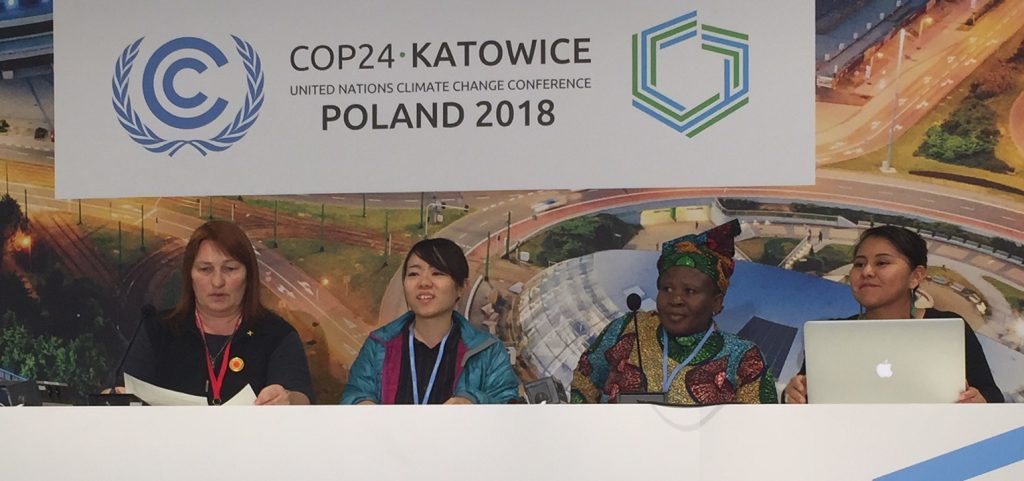 Katowice, Poland – NEWS ADVISORY – Nuclear power makes climate change worse, and must not be promoted under the Paris global climate treaty, environmental and climate justice leaders with the Don’t Nuke the Climate Coalition said Wednesday, 12 December. COP24 has seen a marked escalation in the promotion of nuclear power by countries and corporate interests that are resisting urgent action on climate. Climate and environmental justice leaders from Africa, Asia, and North America called on climate negotiators to refuse calls for nuclear power and false solutions to climate change, which violate the climate justice and environmental integrity principles in the Paris Climate Treaty. Parties must focus instead on a rapid transition to a carbon-free, nuclear-free world, powered entirely by sustainable, renewable energy sources.
Katowice, Poland – NEWS ADVISORY – Nuclear power makes climate change worse, and must not be promoted under the Paris global climate treaty, environmental and climate justice leaders with the Don’t Nuke the Climate Coalition said Wednesday, 12 December. COP24 has seen a marked escalation in the promotion of nuclear power by countries and corporate interests that are resisting urgent action on climate. Climate and environmental justice leaders from Africa, Asia, and North America called on climate negotiators to refuse calls for nuclear power and false solutions to climate change, which violate the climate justice and environmental integrity principles in the Paris Climate Treaty. Parties must focus instead on a rapid transition to a carbon-free, nuclear-free world, powered entirely by sustainable, renewable energy sources.
On Wednesday, 12 December, the coalition presented a petition opposing nuclear power as a false solution to climate change to German Environmental Minister, Svenja Schulze. The petition garnered over 3,500 signatures in just three days. Minister Schulze accepted the petition and signed it herself, and she stated that Germany would not allow any of the funds the country is contributing to the Green Climate Fund to be used for nuclear power. (Photos below.)
“The pursuit of nuclear power in South Africa would have permanently locked us into complicity in putting our country as a radioactive waste zone for centuries,” said Makoma Lekalakala, Director, Earthlife Africa Johnannesburg, and 2018 awardee of the Goldman Environmental Prize for Africa. “By challenging the secret $76 billion agreement between South Africa and Rosatom, we exposed the role of corruption at the highest level of our government. The agreement would have forced South Africans to pay all the costs of a nuclear disaster, contaminated our environment and water with radioactive waste, and made electricity unaffordable for generations,” continued Lekalakala. “We have all of the clean, affordable wind and solar energy we need in South Africa, and overturning the nuclear agreement has put us back on track for a healthy, sustainable future, free of fossil fuels.”
Unlike renewable energy sources, such as wind and solar, nuclear power generation entails major, longlasting environmental impacts and damage to natural resources. The mining, processing, and enrichment of uranium for reactor fuel produces immense amounts of radioactive waste, and has an extensive track record of contaminating land, air, and drinking water–disproportionately affecting indigenous peoples and developing nations. The cooling systems of nuclear reactors place stress on drinking water sources and ecosystems, consuming more than a billion gallons of water per day, and discharging hot water and radioactive effluents. Reactors produce numerous streams of radioactive waste, including irradiated (“spent”) nuclear fuel, which is lethally radioactive for hundreds of years and environmentally hazardous for up to a million years. Indigenous nations and communities of color are most often targeted for radioactive waste dumps.
“Using nuclear power is a direct violation to our human rights and indigenous rights,” said Leona Morgan of Diné No Nukes, from the Navajo Nation. “From uranium mining to waste storage, the entire nuclear fuel chain causes death and destruction to our Mother Earth, to our plant and animal relatives, and ourselves as well as our future generations.”
The consequences of nuclear disasters such as Chernobyl and Fukushima are as overwhelming and long-lasting as the impacts of climate change. Due to rising sea levels, increasing frequency and severity of extreme weather events, and rising water temperatures, the potential for nuclear disasters is increasing along with other risks of climate change. Reducing the chances of compounding catastrophic events should be viewed as a climate adaptation measure.
“Nuclear power cannot be a solution for climate change. Japan experienced one of the severest nuclear catastrophe in history and it is still an ongoing crisis,” said Ayumi Fukakusa, Campaigner with Friends of the Earth-Japan. “Humans cannot afford any more nuclear disasters and fail to solve nuclear waste issues. People affected by Fukushima nuclear disaster are facing losses of livelihood and hometown, as well as poverty and isolation,” continued Fukakusa. “You can never be prepared for nuclear disaster and life after the evacuation is beyond imagination. We can never rely on such dangerous technology. The cost of nuclear power is enormous, and we have much better options to cope with climate crisis,” she concluded.
Contact:
Makoma Lekalakala, Earthlife Africa, +27 82 682 9177, makoma@earthlife.org.za
Ayumi Fukakusa, Friends of the Earth-Japan, fukakusa@foejapan.org
Leona Morgan, Diné No Nukes, +1 505 879 8547, leona.morgan.nm@gmail.com
Kerstin Rudek, Don’t Nuke the Climate +49 1590 21 54 831, kerstin.rudek@gmx.de
ABOUT the Don’t Nuke the Climate Coalition The Don’t Nuke the Climate Coalition is a network of anti-nuclear organisations and networks from all over the globe that work together to keep nuclear out of the climate agreements and implementation of the Paris treaty. www.dont-nuke-the-climate.org
Photos of Don’t Nuke the Climate Petition Acceptance by Germany Environment Minister Svenya Schulze
we handed over our petition to german environmental minister, @SvenjaSchulze68 Minister Schulze promised #stop the false promise that delay energy transition to 100% renewables. #stop subsidies for nuclear power. #no german money for any green climate found for nuclear. pic.twitter.com/26YJIGJdzV
— dontnukeclimate (@dontnukeclimate) December 13, 2018
Background
Despite the immense expense, timeframes, and compounding environmental impacts, nuclear interests are promoting nuclear power as though it is a necessary solution to global warming. This is a major mistake, according to a report released at COP24 on Friday, “Nuclear Power and Climate Action: An Assessment for the Future” (download here: http://www.rosalux-nyc.org/nuclear-power-and-climate-action/). The report was written by Don’t Nuke the Climate Coalition member, Nuclear Information and Resource Service, and published by the Rosa Luxemburg Stiftung-New York City. From real and practical evidence, the report concludes that nuclear power is not a viable tool in the climate solutions toolbox, and that nuclear-free paths to phasing out greenhouse gas emissions are necessary, feasible, and cost-effective.
Paris Agreement Provisions on Climate Justice and Environmental Integrity
https://unfccc.int/sites/default/files/english_paris_agreement.pdf
Declarations: Noting the importance of ensuring the integrity of all ecosystems, including oceans, and the protection of biodiversity, recognized by some cultures as Mother Earth, and noting the importance for some of the concept of “climate justice”, when taking action to address climate change, …
Article 4.13: Parties shall account for their nationally determined contributions. In accounting for anthropogenic emissions and removals corresponding to their nationally determined contributions, Parties shall promote environmental integrity, transparency, accuracy, completeness, comparability and consistency, and ensure the avoidance of double counting, in accordance with guidance adopted by the Conference of the Parties serving as the meeting of the Parties to this Agreement.
Article 6.1: Parties recognize that some Parties choose to pursue voluntary cooperation in the implementation of their nationally determined contributions to allow for higher ambition in their mitigation and adaptation actions and to promote sustainable development and environmental integrity.
Article 6.2: Parties shall, where engaging on a voluntary basis in cooperative approaches that involve the use of internationally transferred mitigation outcomes towards nationally determined contributions, promote sustainable development and ensure environmental integrity and transparency, including in governance, and shall apply robust accounting to ensure, inter alia, the avoidance of double counting, consistent with guidance adopted by the Conference of the Parties serving as the meeting of the Parties to this Agreement.
Additional Photos from the Press Conference
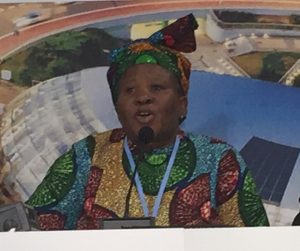
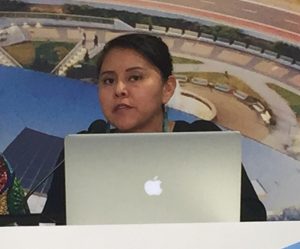
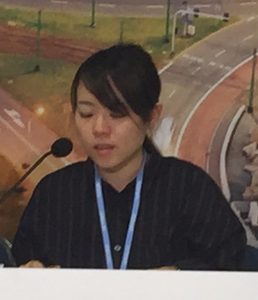
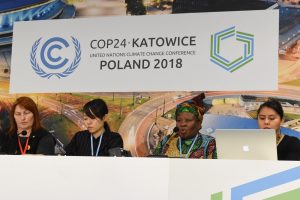
– 30 –




One response to “Press Release: Nuclear Power, Human Rights, and Climate Justice”